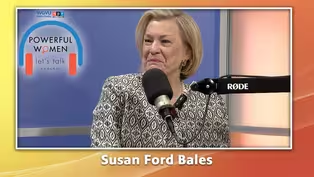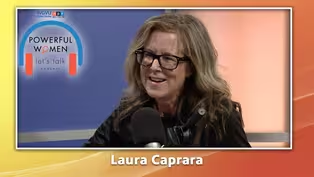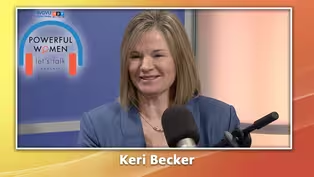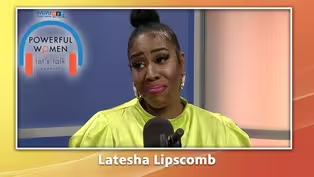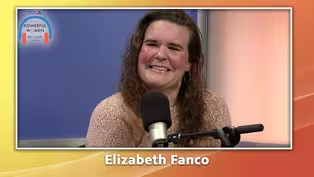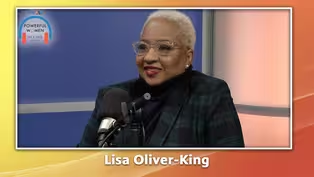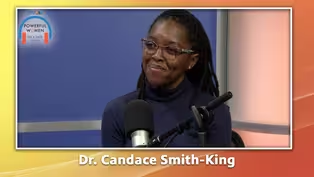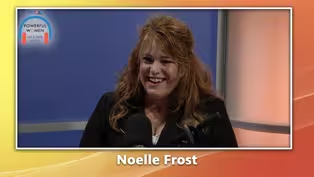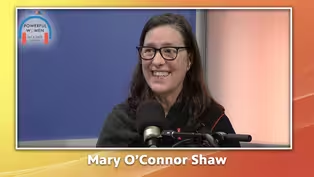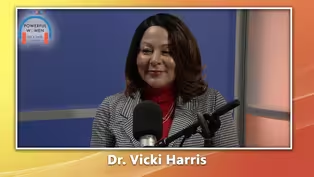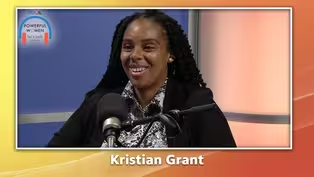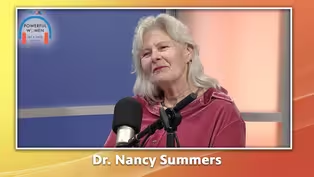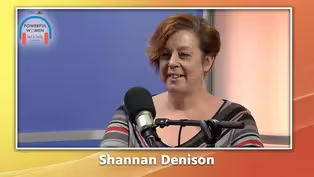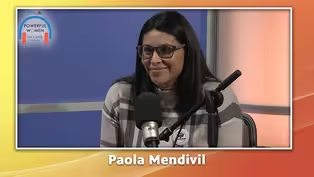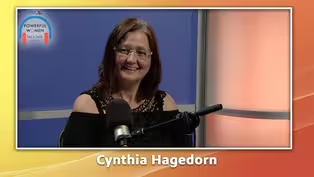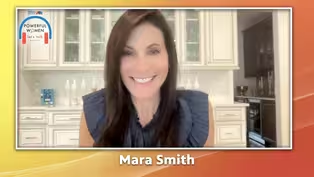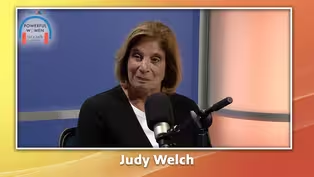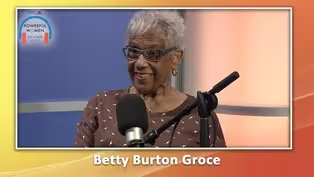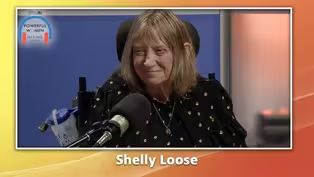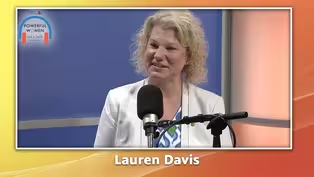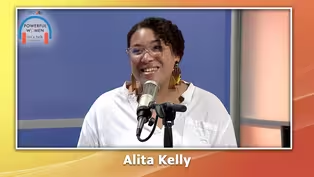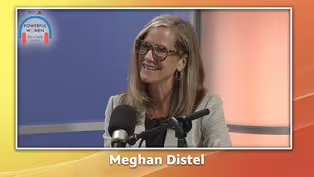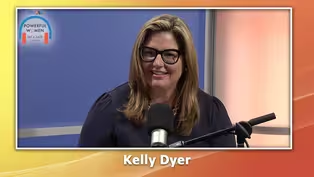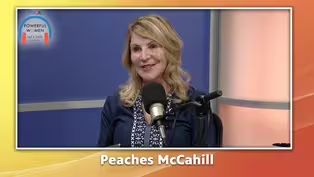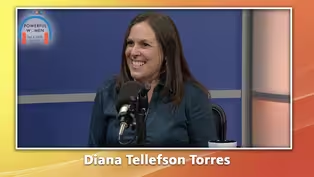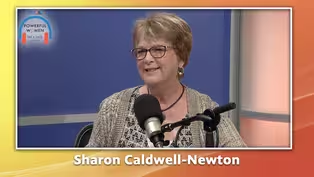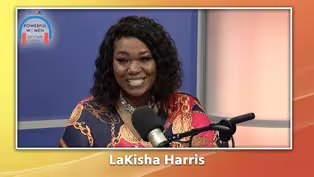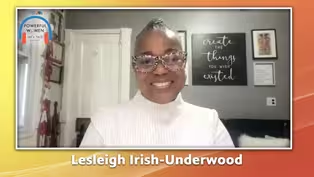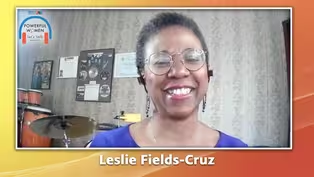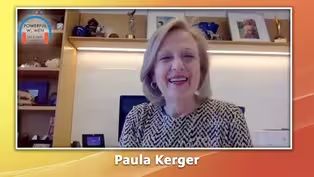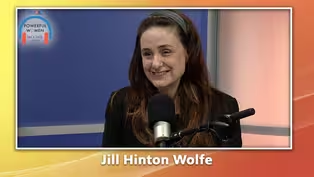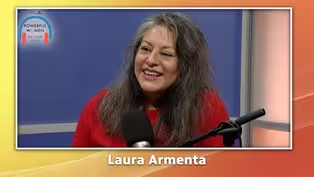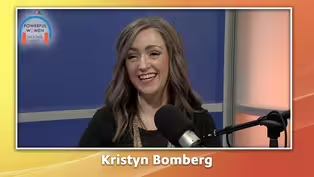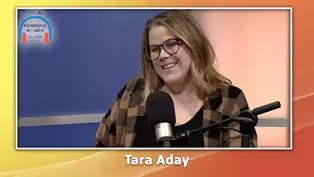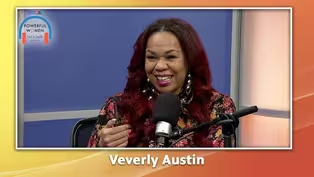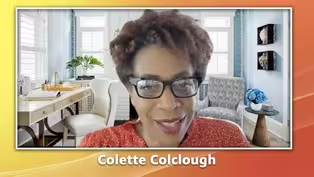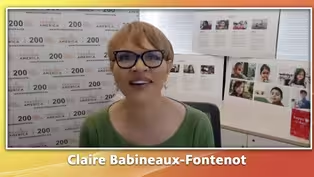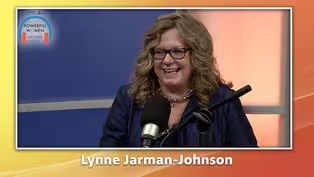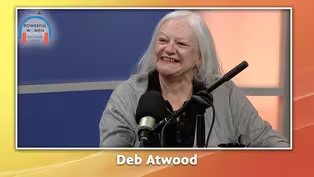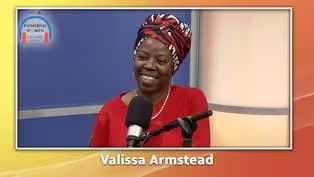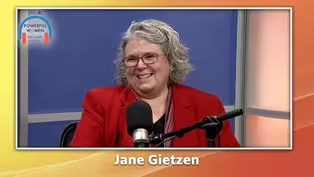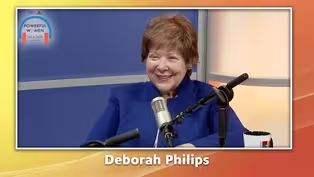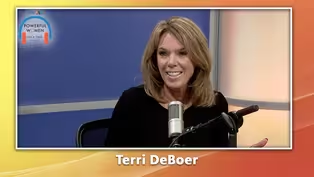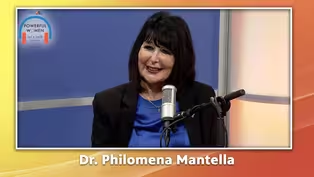Powerful Women: Let's Talk
Keri Becker
Clip | 22m 44sVideo has Closed Captions
Jennifer Moss welcomes Keri Becker, Athletic Director at Grand Valley State University
Keri Becker is the Athletic Director at Grand Valley State University. Keri was appointed by Governor Gretchen Whitmer to the Task Force of Women in Sports that convened 2019-2020. She is a current member of the NCAA Division II Membership Committee, is the current chair of the GLIAC Management council, and a Board of Directors member of the Women Leaders in College Sports national organization.
Problems playing video? | Closed Captioning Feedback
Problems playing video? | Closed Captioning Feedback
Powerful Women: Let's Talk is a local public television program presented by WGVU
Powerful Women: Let's Talk
Keri Becker
Clip | 22m 44sVideo has Closed Captions
Keri Becker is the Athletic Director at Grand Valley State University. Keri was appointed by Governor Gretchen Whitmer to the Task Force of Women in Sports that convened 2019-2020. She is a current member of the NCAA Division II Membership Committee, is the current chair of the GLIAC Management council, and a Board of Directors member of the Women Leaders in College Sports national organization.
Problems playing video? | Closed Captioning Feedback
How to Watch Powerful Women: Let's Talk
Powerful Women: Let's Talk is available to stream on pbs.org and the free PBS App, available on iPhone, Apple TV, Android TV, Android smartphones, Amazon Fire TV, Amazon Fire Tablet, Roku, Samsung Smart TV, and Vizio.
Providing Support for PBS.org
Learn Moreabout PBS online sponsorship>> Produced by women about women, Powerful Women: Let's Talk is a series of interviews with women who are trailblazers and have helped shape our world transforming who we are and how we live.
>> Hello, everyone.
Time for Powerful Women: Let's Talk.
Thanks so much for joining us today and Jennifer Moss.
It is a pleasure to bring you today's powerful woman Keri Becker she's the athletic director at Grand Valley State University.
She spent her entire career intercollegiate athletic spanning 25 years.
Plus she is currently in her 7th year as the director of Athletics at GVSU prior to being named director of athletic, Becker'’s career has always been on a college campus.
She started her journey in the 1990, as 1990's.
As a softball student athlete at Division II Saginaw Valley State University then moved into the head softball coaching position in 1996 at yet another rival school Ferris State University where she stayed for 15 years.
Now in 2011, GVSU brought her on board as the associate athletic director and senior woman administrator.
And now she's in her 7th here.
Here is the director.
Lot of powerful woman stuff going on.
Kari back.
But we surely welcome you to powerful women.
Let's talk.
Thank you.
Yeah, we enjoy that and a little bit more about here.
Before we start our conversation.
She was appointed by Governor Gretchen Whitmer to the task force of women in sports that convene in 2019, 2020 season, a current member of the NCAA Division, 2 membership committee, current chair, the Glee at Management Council and the board of directors member the women leaders in College Sports National Organization.
And she was awarded the Michigan Ace, Distinguished Woman in Higher Education Leadership Award as during the summer of 2022.
Most recently GVSU Athletics receive the NCAA Illinois Award for diversity and inclusion.
Trust me, this is the short list we could go on and on.
But let's talk.
So we want to welcome you again and just say, you know what a pleasure it is for you to be here.
As we start.
We should mention that under your leadership GVSU has continued its dominance at the division 2 level.
We claim 28th overall a Great Lakes, Intercollegiate athletic conference, GLIAC at Presidents Cup title as the league.
All sports champion and winning the 2021.
22 division all sports Lear field IMG College Directors Cup crown for the 14th time as these certainly some big accomplishments it was going.
Wow.
Wow, my question for you is are you enjoying the journey?
>> There's no place.
I'd rather be.
I love what I do.
Do I do with and where I do it.
And you know, when you know, I'm a I was an athlete, a heart going up and I never thought athletics was a career path in till I think it shows me and now that I'm in it, there's nothing else I'd rather do.
So.
Absolutely.
Love coming to work every day.
And and seeing student athletes mature through the process and develop our coaches, develop talent, leadership to the contacts, a sport.
So no better job.
Absolutely.
That's a good part of the journey to be able to say that you enjoy it.
>> So a lot of accomplishments again under your belt as we talk about powerful women as we often do.
Have there been any barriers, you'’re in this good space now, but, you know, you don't get there without a lot of work along the way and the years that you put in and as you travel along this journey is that just are nice pass.
>> Have they been barriers that you perhaps encountered?
He'll be in a female in college sports where it's a it's a male dominated.
Where can I get that question?
A lot in the thing that I think is different for me is I'm a twin and twin brother.
So I was raised with Boys.
And so I never, you know, people say, you know, you know, that must have been tough to navigate your career through athletics.
When I reflect back, I think it's just my upbringing.
Boys are always a part of my upbringing.
The always part of my life.
They're always part my competition.
So as a non-issue for me, I never saw them is creating barriers for me or the barriers.
I think when I think back in my career, I was I really created for myself.
The one the barriers of self doubt, the barriers of, you know, being able to be in the room, know that you belong in the round through mentorship and through just doing and being competitive.
If there's one word to describe me it'’s competitive being competitive, at my core, you overcome those barriers, you go through them, you go over, go around him.
Well, you get people to help him move on.
And I think that's the key.
When I think of any barriers, whether real or perceived that I think help me navigate those and in.
So it's it's hard for me to answer that question because when it I felt like I just I just worked.
I just did what I thought was right.
I just continue to put my head down and created value.
Whoever I was that I wanted to in in in take the opportunity to not just do the job in front of me, but figure out how I can help those next to me.
And that really helped me expand my breath of experience within the world of college athletics and then set me on this path to continue to go from coach to associate AD to an AD.
Yeah.
>> And I think, too, with a lot of women, it is a self-inflicted deal for the barriers.
Sometimes clearly there are many real barriers we face and you're trying to make progress in our careers and other where the areas of our lives.
But I think sometimes it is that self doubt that some reflection things and that we kind of come up with.
And so so as you did this and continue to move through your journey, how do you feel about?
I mean, how did you actually find your voice?
So you went around.
He went through it.
You found people to help you out, maybe.
But in a lot of times it takes.
Is that something to get your inner voice in to be comfortable in your own skin and own it.
how did you get there?
I like how you say be comfortable in your own skin and that's part of it.
>> And that's that becoming that's that had given, I think a little more faith in people that they are not looking at you through the lens that you're looking at yourself, which is usually deficiencies that they're looking at.
Wow, in really paying attention to the the positive accolades, the things that you did earn and knowing that you deserve them.
And so once you say, yeah, I I am good.
Yes, I am ready.
Yes, I want to do that and keep stepping forward and raising your hand, the more you do that.
I think you develop this confidence.
I go along this way either have to have confidence.
You you approach every situation with the confidence the courage one is higher than the other typically.
But you can tap into one and that's what can help you can propel yourself.
And then as you get as you have some small successes celebrating the small winds and that builds more confidence and more courage and the like.
>> Absolutely news that courage sometimes to develop the confidence that pushing through you back regardless of how you feel at the time as well making it happen.
>> So we should also mention you are a military veteran And what impact would you say your service has had on your life and perhaps even in the role as athletic director?
How does that all come to get your?
Yeah, you know, I agree to join the military 1992 during my college career as Army reservist and I again, my twin brother was that cataylst.
Because when I went away to college, he went to the army.
I saw him come back from basic training.
He walked different.
He talked different and he exhibited some leadership qualities and like, wow, I want I want that same experience.
I didn't want to go and I love my college experience.
I was on a different path from an educational standpoint.
So join the reserves again, a few bucks to help pay for college.
But then more importantly, I got to be a part of the biggest team in the world, the greatest team in the world.
And then and I'm going to emphasize the word service, right?
It is that service to something greater than yourself.
And then you get to meet just an amazing diverse, a group of individuals throughout that experience, fast forward to 9.11, 2001.
And after that Operation, Iraqi Freedom and enduring Freedom I got called from in active service, actually wasn't even a active military service.
I was inactive, but there's a whole reason for that and get called to active duty for a year.
And you want to talk about just a whole different experience to a different part of the world that I've never been and never been across the Atlantic Ocean and this now going to the Middle East and then being a female in that environment and how I had to grow and how I had to really understand that culture.
And it was it was it was it was tough for me as being a strong female going into a culture where the females have a different status if you want to be.
But it was a learned it was OK because you had to depend on your counterparts to help you navigate that in and just make your way you had to almost start over and create your value and create relationships with the people in that country.
And then you realize that it was no longer really about my status as a female.
It was just like anywhere out shift to create relationships and connections to what you're doing.
And that's how you can still do the work fast forward to what is the impact.
And I think the military, it's just a different type of I like structure.
I like organizational structure chain of command.
And so I think it had impact in terms of how from an operational standpoint, right?
Leading people managing things.
I think it really help me organize and manage the things.
It wasn't necessarily helpful in leading people.
But I did like a lot of the military concepts of teamwork and accountability.
So those are some of the pieces that I've taken.
And I would imagine that you can use those to really finally all the time in what you're doing now, the teamwork, that building.
>> Leadership, you know, all of those things.
So how important also then we talked about you met a diverse culture as when you were in service.
How important is diversity and inclusion in the world of collegiate sports?
I note again that GVSU Athletics.
I did receive an award for diversity and inclusion.
Sure.
Thank you.
If you know that was I'm not a big award person.
But as I've risen to the point where you're the person that gets the award, you have to be in or person because you're the one that gets to accept that we hard award on behalf of everybody.
That brings that more to life, the work that everybody is doing.
>> Whether from student athletes to coaches, to campus partners, to our staff members.
And so I've changed my thinking on that.
I'm a little bit.
And and so I'm humbled to be able to achieve it or to accept it, but grateful that we were able to achieve it all together to get that award was an important.
I think it did.
There's no more important thing than to make sure that our student athletes come to Grand Valley and have the highest sense of belonging with within our teams in our locker rooms.
There's no important thing.
Then our staff having a sense of inclusion and belonging.
And so if we're going to get all of the potential our student athletes and being a part of that growth process, they need to be able to bring their whole selves.
I used to have a saying when I was a coach check in at the gate.
The only thing that matters in this in the on the softball field is what makes us to saying our common goals, right?
It's actually flipped upside down.
You want to be able to bring your whole self in that gate and become too.
So you learn to be comfortable in your own skin to be valued for what makes you not that makes you like us, but different from us.
So right.
And so it's that whole idea, this whole holistic approach to coaching the person in front of us.
So you have we want our coaches to develop talent and into in leadership to the context of sport.
But we also wanted to have a great experience within their team and within the athletic department, ultimately the campus at Grand Valley.
So if we can do that, to make sure that we get have a increased in aware, understanding of our differences, that you can value that facilitate having conversations set about creating safe spaces but brave spaces.
It's about being able just to hold space for coaches are experts in this work.
But then they have to have an openness and willingness for all of our student athletes to feel that sense of belonging kind of goes back to that work, courage to moving forward with the things that, you know, lecture learning and not being afraid to say, OK, we're going to do this with this way and everybody's included insurers process may be.
So you work with a lot of people, of course, an impact.
A lot of people in your circles tell me the Lee even mentioned leadership as you are in the service and learn some traits there.
What leadership traits do you like to see in the people that you work with, perhaps mentor and that you're working with on this journey?
Yeah, I think openness to innovation and change and their ability to evolve.
I think one of the biggest things I learned is I did all this work and professional development and trying to figure out the leader.
I was going to be once you sit in the chair of the of of leadership as a director of athletics, it's no longer about you.
It's about what your team needs.
And so it's a different so it gets to what you're talking about.
What is it that you're looking for, which usually is the same things.
And, you know, these things are important to me.
So I wanted to be important to them.
Well, what you realize is everybody is going to do it a little bit differently and they're going you have to make sure you're creating value for what their strengths are.
And so the things that I look for is I think I just want people to have a sense of awareness of what what our common goals are, but also what the differences are and figure out a way to value that each other.
I want people to have to understand the value they have what were alternately trying to be to do.
We're trying to create the best student experience possible.
Whether your coach are you whether you work in compliance or athletic training and our medical staff.
I want them to understand why they matter to what we're trying to do.
And so it's that it's that alignment of their values and how they work with what we're trying to do.
So it's awareness and that it's also just in their ability to be collaborative 2, I'm okay with it.
It's not my job necessarily set up tables and chairs for the event.
But I'm I'm not above that.
Its to do that.
Everybody to be able to raise their hands and really did to help out, for instance, our tennis team.
We have a lot of international students and student athletes.
We we come we practice every day in Granville Premier tennis center.
So we have to drive in.
There were a lot of international students do come here with cars.
So we have some vans will now our coaches got to go back and forth picking up teams.
But there's a there's a day Tuesdays and Thursdays where need somebody so the coach can be at practice.
Can we find someone to drive the van?
Someone sent out an e-mail saying Tuesdays and Thursdays, will anybody from one, 30 to 30 be willing to go back and forth?
And I know when I send that out, we're going to get people to raise their hand.
So that's this.
Those are the types of people that I want to need to be a part of our department, a team that routine.
Absolutely.
>> So we mentioned off the top that you spent your entire career for the most part, an intercollegiate athletics.
And you're an athlete, of course, yourself.
What inspired you to go that route?
And was it always your goal to maybe perhaps get to a position such as this train?
>> Well, I always say people athletics chose me.
I did not know or think that it was a career path.
I was a game and a graduate in criminal justice.
I was about halfway through the process to be a state police officer.
That's what I wanted to do.
Or firefighter I had actually right before I took the position at Ferris is the head coach.
I was a finalist to be a firefighter in the city of Saginaw.
So I knew I want to do one of those 2 things.
The state police process was long, you know, if it was going to happen.
And so I had hedged that with being a firefighter at the all.
I'm getting ready and they're going.
I was the final 3 at the same time the I had gotten to know at Saginaw Valley, working in the inner mural department, which was in the athletic department, the assistant basketball coach who left and went became the head coach basketball coach Doctor Data month at their state University.
She saw something in me that I didn't see.
She talked me into applying for the head softball position that had come open and let them know.
Hey, I didn't ever think of it as a career.
Long story short.
They hired me.
I make this joke that the job was a full-time job.
Full benefits, retirement medical $30,000 a year.
It was about $28,000 more than I was making at the moment.
So I said I can do this for 3 to 5 years and then still go be a police officer.
Why?
I fell in love with being on a college campus.
I fell in love with with developing young women to the sport of softball.
And my favorite thing is to watch the maturation process of a freshman student athlete and as they progress and then hopefully maybe in and then leave is a senior, they walk differently, talk different.
And then you realize just maybe the impact she may have had on that.
And so that's where I fell in love with it and then continue to just all of a sudden I looked up.
It was 7 years later.
It was 8 years later.
And then it was 15 years later.
Now I knew I wasn't going to be that great here.
Little lady, right around softball field, though.
There's nothing wrong with that, right?
That's when I started to expand my breath of experience into some of the administrative things and then that set me up to then at that point, you're like I I want to stay in a college campus.
That's the next step is administration.
And then from being associate AD why not me as the AD.
So we decided to place my best foot forward will be done if they hire me again and the rest as they say is history.
So, yeah, that's right.
Way.
Doing a great job with the show you.
How do you manage all of this, though?
Your work?
Life balance your very busy.
You know, sports keeps you busy.
You are the director.
You're not just not.
I mean and coaching is huge.
But being in charge of everything.
Yeah, that's a lot.
How do you manage that?
Your work?
Life balance.
It's never imbalance.
That's a myth.
But what you do have to here's I've been talking to some of my senior staff and I you know, and there's a lot of people are department that they work so hard to make Grand Valley successful.
They give so much to that.
I said here's the deal.
If you I love that.
I want you that the university has to get back to you and they and you can't give what you don't have.
So I need you to take care.
You and I need to model that.
So probably in the last couple years.
I've got better at it Monday morning.
I'm leaving for Mexico for money the Friday.
I've never taken a vacation this time of year.
It is extremely busy going into the strain.
But you know what?
I've missed a lot of weddings, a lot of birthdays.
A lot of things.
I'm no longer going to miss those things.
It's OK, I have a great team.
And so I try to echo that and not one model.
It was my staff.
You have to take vacation.
You have to even if it's a half a day, doesn't have to be a whole week.
There's people that can't leave for 3 weeks at a time or 2 weeks.
That's OK, but take the time.
And so I'm just it's it's that simple.
You must take the time university.
You earned vacation to the university.
They they carry over only so many.
If you don't use that, you're giving back time.
University is invested in you.
They said you can have that time.
You must take it.
It is.
It sounds silly, but you must take vacation even if it's 2 hours, if it's 02:00PM.
And I look out the summer and it's sunny and going about, I'll see you tomorrow.
Absolutely.
So some of this opportunistic, you know, some of this planned some of its opportunistic to take those moments.
But also and you this job, you don't do this work at the expense of the things that are important.
If you say families important doing your work should be at the expense of that.
You better go to your son's tee ball games.
You you know, you have to make that a priority.
So I try to hold my staff accountable.
That may have been very good at it.
But it's one of those things that I'm starting to so learning curve.
Yeah, so yeah, but I have certain myself.
Yeah, right.
So that you can model have that leadership for the Avs to fall out there.
Got to find a way to fill the fill to come back up.
So easy.
Breezy question.
One of my face.
What is it that makes you laugh.
>> Everybody, you know that I just feel like laughter is good for the soul.
I like it laugh all day.
If I if you know you've got work to do, but >> I love laughter.
So what makes you a cash are so many things.
You know, one of the I don't know if there's a thing that makes me laugh.
But what I have done is I think sometimes we have we think we have to be in situations where always serious, we have to be a certain way.
But if something happens or somebody says some, I don't hold him because maybe it's not appropriate.
I laugh.
Yeah, right.
And what I find is people are just wait for the people to laugh.
And and everybody shoulders go down a little bit absolute.
You know, so I don't know that there's any one thing and they can point it's like permission.
You know, I had permission to laugh because they're funny too much in the world that can bring you down.
So it is funny if weast, if I'm in a staff meeting and are maybe not in it.
But I'll start a look at this cat video.
This is hilarious, whatever it is and just sharing those types of things where it's not just always about, you know what it is.
We got to doing it.
You know, get the objectives done.
If it's funny, we laugh taken role with the bat.
>> Yeah.
So so much is happening.
Of course, as I mentioned in the in the world that we live in today, people are often looking, though, for that word of encouragement, something to perhaps inspire them.
You have any favorite sayings are models that you share with and those you are working with those you mentor or and people in your in your own.
>> I think there's 2 things be the change in the world.
You want to see that?
It goes back to my modeling, right?
But I think the biggest thing I always say, I say it over and over be where you need to be when you need to be there and goes back to what I was saying in private.
You know, if you're with your family, don't worry about checking that email and vice versa, be able to be where you need to be when you need to be there and it allows you to give context and perspective to what you're doing and focus.
Okay.
Say that the things that you're in front of deserve.
All right.
The person in front of you deserves all of you salute.
Lee could work in Cary.
>> Keri Becker I really enjoy this conversation.
So nice to catch up with you today and and talk with you.
I want to thank you as well for joining us for another edition of powerful women.
Let's Talk.
I'm Jennifer Moss.
Do enjoy your day
Video has Closed Captions
Clip | 14m 7s | Shelley Irwin welcomes Susan Ford Bales, the only daughter of President Gerald R. Ford. (14m 7s)
Video has Closed Captions
Clip | 23m 5s | Shelley Irwin has Laura Caprara, founder and owner of Stellafly on for a chat. (23m 5s)
Video has Closed Captions
Clip | 22m 44s | Jennifer Moss welcomes Keri Becker, Athletic Director at Grand Valley State University (22m 44s)
Video has Closed Captions
Clip | 20m 14s | Shelley Irwin welcomes Latesha Lipscomb to the podcast (20m 14s)
Video has Closed Captions
Clip | 29m 3s | Elizabeth Fanco is a mother of eight who farms, coaches soccer, and runs for a cause. (29m 3s)
Video has Closed Captions
Clip | 23m 28s | Lisa Oliver-King returns to Powerful Women: Let’s Talk with Jennifer Moss hosting. (23m 28s)
Video has Closed Captions
Clip | 16m 29s | Jennifer welcomes Dr. Candace Smith-King to Powerful Women: Lets Talk! (16m 29s)
Video has Closed Captions
Clip | 18m 9s | Noelle Frost is our guest on this episode of Powerful Women: Let's Talk! (18m 9s)
Video has Closed Captions
Clip | 16m 39s | Mary O'Connor Shaw is Shelley's guest on Powerful Women: Let's Talk! (16m 39s)
Video has Closed Captions
Clip | 17m 31s | Dr. Vicki Harris is our guest on this episode of Powerful Women: Let's Talk! (17m 31s)
Video has Closed Captions
Clip | 15m 28s | Kristian Grant is our guest on this episode of Powerful Women: Let's Talk! (15m 28s)
Video has Closed Captions
Clip | 16m 48s | Dr. Nancy Summers is our guest on this episode of Powerful Women: Let's Talk! (16m 48s)
Video has Closed Captions
Clip | 15m 17s | Shannan Denison is our guest on this episode of Powerful Women: Let's Talk! (15m 17s)
Video has Closed Captions
Clip | 18m 49s | Paola Mendivil is out guest on this episode of Powerful Women: Let's Talk! (18m 49s)
Video has Closed Captions
Clip | 17m 4s | Cynthia Hagedorn is our guest on this episode of Powerful Women: Let's Talk! (17m 4s)
Video has Closed Captions
Clip | 18m 27s | Mara Smith is our guest on this episode of Powerful Women: Let's Talk! (18m 27s)
Video has Closed Captions
Clip | 19m 36s | Judy Welch is our guest on this episode of Powerful Women: Let's Talk! (19m 36s)
Video has Closed Captions
Clip | 28m 18s | Betty Burton Groce is our guest on this episode of Powerful Women: Let's Talk! (28m 18s)
Video has Closed Captions
Clip | 13m 27s | Shelly Loose is our guest on this episode of Powerful Women: Let's Talk! (13m 27s)
Video has Closed Captions
Clip | 17m 51s | Lauren Davis is Shelley Irwin's guest on this edition of Powerful Women: Let's Talk! (17m 51s)
Video has Closed Captions
Clip | 17m 49s | Alita Kelly is our guest on this episode of Powerful Women: Let's Talk! (17m 49s)
Video has Closed Captions
Clip | 20m 32s | Meghan Distel is our guest on this week's episode of Powerful Women: Let's Talk! (20m 32s)
Video has Closed Captions
Clip | 22m 16s | Kelly Dyer is our guest on this episode of Powerful Women: Let's Talk! (22m 16s)
Video has Closed Captions
Clip | 18m 41s | Peaches McCahill is our guest on this episode of Powerful Women: Let's Talk! (18m 41s)
Video has Closed Captions
Clip | 18m 30s | Dr Lisa Lowery is our guest on this episode of Powerful Women: Let's Talk! (18m 30s)
Video has Closed Captions
Clip | 22m 29s | Diana Tellefson Torres is our guest on this edition of Powerful Women: Let's Talk! (22m 29s)
Video has Closed Captions
Clip | 13m 42s | Sharon Caldwell-Newton is our guest on this edition of Powerful Women Let's Talk. (13m 42s)
Video has Closed Captions
Clip | 32m 25s | Chef LaKisha Harris is our guest on this episode of Powerful Women: Let's Talk (32m 25s)
Video has Closed Captions
Clip | 18m 16s | Lesleigh Irish-Underwood is our guest on this episode of Powerful Women: Let's Talk! (18m 16s)
Video has Closed Captions
Clip | 27m 34s | Leslie Fields-Cruz is our guest on this episode of Powerful Women: Let's Talk! (27m 34s)
Video has Closed Captions
Clip | 20m 21s | Paula Kerger is our guest on this episode of Powerful Women: Let's talk (20m 21s)
Video has Closed Captions
Clip | 19m 25s | Jill Hinton Wolfe is our guest on Powerful Women Let's Talk! (19m 25s)
Video has Closed Captions
Clip | 17m 4s | Joanne Roehm is our guest on Powerful Women: Let's Talk (17m 4s)
Video has Closed Captions
Clip | 20m 40s | Laura Armenta is our guest on this episode of Powerful Women: Let's Talk! (20m 40s)
Video has Closed Captions
Clip | 19m 51s | Kristyn Bomberg is our guest on Powerful Women: Let's Talk (19m 51s)
Video has Closed Captions
Clip | 16m 18s | Laina Mills is our guest on this edition of Powerful Women: Let's Talk! (16m 18s)
Video has Closed Captions
Clip | 18m 39s | Tara Aday is our guest on this episode of Powerful Women: Let's Talk (18m 39s)
Video has Closed Captions
Clip | 13m 47s | Veverly Austin is our guest on this edition of Powerful Women: Let’s Talk! (13m 47s)
Video has Closed Captions
Clip | 22m 35s | Colette Colclough is our guest on this edition of Powerful Women: Let's Talk! (22m 35s)
Video has Closed Captions
Clip | 30m 7s | Claire Babineaux-Fontenot is our guest on this edition of Powerful Women: Let’s Talk! (30m 7s)
Video has Closed Captions
Clip | 21m 36s | Lynne Jarman-Johnson is our guest on this edition of Powerful Women: Let’s Talk! (21m 36s)
Video has Closed Captions
Clip | 15m 25s | Deb Atwood joins us on this edition of Powerful Women: Let’s Talk! (15m 25s)
Video has Closed Captions
Clip | 19m 9s | Storyteller Kishen Newton is our guest on this edition of Powerful Women: Let’s Talk! (19m 9s)
Video has Closed Captions
Clip | 22m 26s | Brenda Brame is our guest on this edition of Powerful Women: Let’s Talk! (22m 26s)
Video has Closed Captions
Clip | 14m 39s | Valissa Armstead is our guest on this edition of Powerful Women: Let’s Talk! (14m 39s)
Video has Closed Captions
Clip | 13m 32s | Jane Gietzen is our guest on this edition of Powerful Women: Let’s Talk! (13m 32s)
Video has Closed Captions
Clip | 15m 37s | Deborah Philips joins us for WGVU's Powerful Women: Let's Talk (15m 37s)
Video has Closed Captions
Clip | 23m 58s | Terri DeBoer is our guest on this edition of Powerful Women: Let's Talk (23m 58s)
Video has Closed Captions
Clip | 26m 50s | Dr. Philomena Mantella is our guest on this edition of Powerful Women: Let's Talk! (26m 50s)
Providing Support for PBS.org
Learn Moreabout PBS online sponsorshipSupport for PBS provided by:
Powerful Women: Let's Talk is a local public television program presented by WGVU
